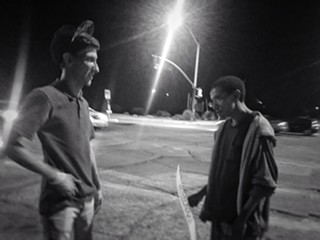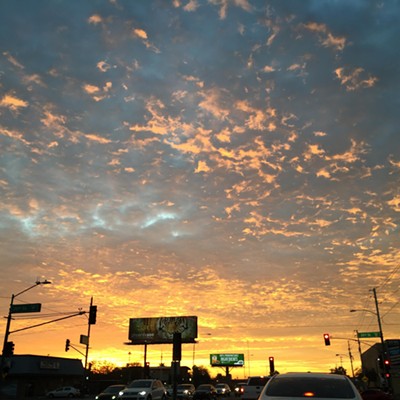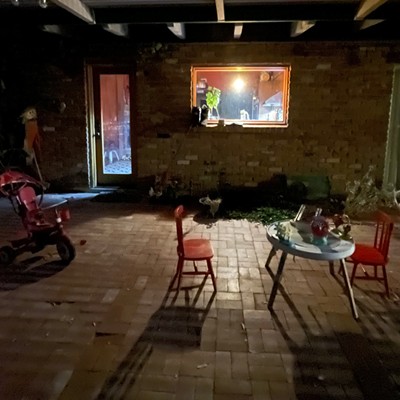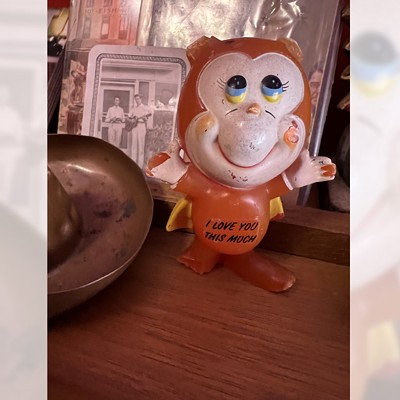Caution Somemore looks like a kid but says he turns 29 in October or something. He wears glasses and an unzipped hoodie and has perfect skin and close-cropped hair and he smiles sort of. He doesn't have that shame or foreignness that makes him look away when he talks, which surprises me a little given the circumstances. His sign reads "Homeless" and it twirls side over side and I wonder how he does that because I've seen people in disturbing Statute of Liberty costumes on major thoroughfares at tax time spinning signs the same way and I'd love to run them over despite knowing how cruel and absolutely insane that would be.
This whole nighttime scene has that slight smarmy feel of street shtick so maybe he's dealing shit? Says he isn't selling, and anyway he really is homeless, it turns out.
We're not in the city but standing on a desert corner at Old Spanish Trail and Camino Seco on Tucson's eastern outskirts, so it's weird to find a guy entreating donations, however gently, from passersby on a little road that bends up out of safe '70s suburbia and into the desert toward the heaven of Saguaro National Park. He waves hello to cars before they hit the intersection like a guy working a carwash because he knows people and understands how to earn coin—he's smart and savvy like that. He has to be. Or he starves. He flies his sign at night because drivers are less judgmental than in the daylight and he won't smoke because that's a donor turn-off, he says, but if he flies his sign in the rain folks have more sympathy and he earns more coin. (Holding a sign saying you're homeless or that you'll work for food or whatever is called flying.) You get the idea.
He discovered this corner without having to dispute another flyer for it like he did recently over at Broadway and Camino Seco, that lady who actually has a home but who, Caution says, claims homelessness "so she can earn her daily $60 and order things online."
And beneath this suburban topsoil, under black skies and mostly in silence, but with that dreamy smell of the desert, there's a peculiar underbelly of street hassle.
He hears the most racist shit you can imagine, mostly from white kids. It's not lost on him that the chirps and yodels and threats have gotten worse lately too, in frequency and in tone, since Trump's rise, and all he can do is be entertained by it all.
In the months Caution's been flying, no one has stopped to take action on their words, and I'd wager he's one gangling black dude who could scrap with the best of them.
"Let 'em try," Caution says, pokerfaced with unblinking eyes. "They have no idea what they'd be dealing with."
His own anger has backed him into corners in life, fueled his paranoia. "I spend a lot of time meditating to quash my anger."
His two kids stay with his mother and he's not allowed to see them because CPS snatched them away, and their mother is down south somewhere. But she's coming back, Caution says, and then he'll get right with her and his kids but in this moment he's not up to talking about his children except to say with a WTF look that he's in lots of pain and missing them hard.
He's worked in kitchens, dishwasher mostly, steakhouses and the like, but then his anger gets in the way and the jobs go away.
Over the four days of Memorial weekend, he earned $260 at Broadway at Wilmot, flying between two and six hours each day. A good take but there's hardly a wage worth the humiliation of flying where "even making the sign strips you of your pride."
What looks like a rental car rolls to stop at the intersection and the passenger window comes down. Caution steps over, retrieves a bill, and thanks the man. He steps back and talks paranoia, the kind that keeps him sleepless and walking all night. Sometimes he uses whatever internet access on temporary phones to stay occupied, for hours.
A woman strolls along in the dust. No one strolls out here at night. She's gray-haired, ravaged and moves with that hasty, limp-challenged street gait of anyone who's lived too long without walls. Without breaking stride, she hands Caution an unopened package of fudge cookies and continues into darkness toward 22nd Street. Cars pass her on Camino Seco and she seems a long way from the lives inside of them. Even her presence leaves me feeling lonely.
"She lives around here," Caution says, and leaves it at that.
After awhile three white dudes appear, moving toward us up Old Spanish Trail. They walked out from the desert dressed in beiges and blues and reds. They look like they're from good homes and maybe stoned or something else and they sort of drip of menace in that bored white suburban way, which is in my experience the worst kind of menace. First thought: eminent beatdown.
Caution diffuses whatever real or imagined menace by telling them that I'm "from a newspaper" and writing shit down.
The one with short blond hair, Josh, says, "we've been on an adventure since noon." The taller skinny one says he's Caleb and he's all twitchy, scratching his face and arms. The third is walking around the desert, kind of circling.
The 23-year-old Josh can talk. Like anyone who talks too much, there's a part of his cognitive sense that seems to detach and so he becomes his own enthralled audience. He's interested that I'm writing stuff and begins to talk whiskey and Iowa and about a narrative essay he's been writing. I overhear Caleb telling Caution that his head got smashed in by his girlfriend last week. He says some other shit and Caution suddenly packs up his backpack and sign and milk crate and is ready to go to Taco Bell, now.
We split and find Caution's friend C packing up his shopping cart—he's been flying for hours in front of the Taco Bell on Broadway near Camino Seco.
They're an odd couple, Caution and C. Caution digs Insane Clown Posse and C likes blues, jazz, folk. C's a wrench-puller's son from Indiana and has four siblings. He drove an 18-wheeler for years, coast-to-coast. He looks older than his years, a gray swath of hair wraps the lower region of his bald head, and he mostly gums his food. C has no wife nor is he father to a family. Says one time he walked in on his wife fucking his best friend, and that was that. He packed and left.
C was the family outcast, but had dad's work ethic, "where you start something you finish it." He was very close to his mother. When she died, C spread her ashes around Tucson, in her favorite spots, and around where he flies. She'd lived in Tucson. She'd taken what little money she had after her husband had died and left Indiana and rented a little apartment here. That's what brought C to Tucson. He was taking care of her.
The bi-polar thing runs in his family and he has a bad temper and was told by doctors he should never work. They told him that and yet he can't get on disability here but spent seven year trying to get on it. He and Caution sleep in stairwells, behind industrial centers, between bushes, places cops won't hassle them.
The two hooked up several months back, and sometimes C talks and Caution's eyes roll: he's heard C's yarns. The two aren't lovers but they watch each other's backs.
"You have to," C says. "It's dangerous out here by yourself. And I tell you, if you don't have anybody to talk to or socialize with you will go crazy."
"Where do you shower?"
They both laugh.
"Where do you poop?"
C shakes his head, and Caution, looking around the muted orange and chocolate interior of the Taco Bell, says, "places like this."
C nods. "You buy food, you use the bathroom."
They get uncomfortable when I ask their proper names. Caution Somemore's the name he uses on his Facebook page. C says that beyond the eat-shit humiliations he deals with daily, all of which add up in his psyche, his anonymity is all he has left, if I can believe that. He figures that's why so many out here only go by nicknames.
C's been on the street solid for more than three years. His gift of subtle humor rises when he describes things that aren't normally funny, like fact-resistant lunacies of holocaust deniers, especially those he'd met over the years who've tried to denounce his uncle's World War II presence after he was one of the first Americans to see horrific insides of concentration camps.
Sometimes C writes "will work for food" on his sign and gets work, but only when it's not so hot out.
They talk ins and outs of flying signs like anyone would around the water cooler. "Youth's an asset on the streets and Caution looks young," C says. "He does well, looking 16 or 17," and he laughs, "it makes me sick. But that's not to say that it's not racist out here. People think it's not as racist as it used to be, but it many ways it's worse. Some people ought to be dropped into a time machine and shipped back.
"Homelessness is a disease that's contagious," he continues. "If you let it get too far ..."
"... You might never make it back," Caution says, finishing the thought.
"That's right," C adds. "Put in an job application when you're homeless. Right."
"And when people give you food you need to wash it," Caution says. "People spit in it."
"I opened a hamburger someone gave me and it had used condom in it," C says.
It's hard to explain but Taco Bell's kind of wrenching inside and it doesn't help that some lady, I'd say an old lady, squinches her face into a dirty look at us, and makes a point to walk wide around us as she's heading out. These guys are outside all day everyday and they smell like how people smell when they're outside all day everyday and they look like that too, and this old white lady had to show her absolute disgust.
Ceej works the Taco Bell counter and she has a good eye on things, so she steps over and says, "these two are really nice ones. Sometimes the homeless aren't like that here. Be nice to them."
C takes lots of time to eat, and Caution's lost patience and is outside in the parking lot. C stops chewing, and says, randomly, as if airing a private thought, "Mom said I was a miracle baby. I wasn't given more than 48 hours. It's been 48 years."









